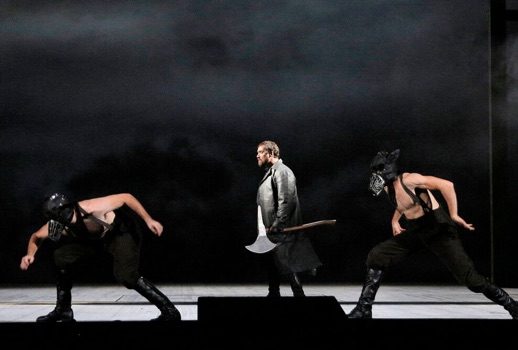

Sippen und Hunde ruft er zusammen.
At the end of the stunning Act One of last night’s opening of Die Walküre at Lyric Opera of Chicago, I had a most remarkable experience. Audience members around me began saying “Wow!” out loud.
The phenomenon spread as other audience members heard these cries, and picked it up with “Wows” of their own. As we moved to the lobby for the first intermission, everyone seemed thrilled with the performance. And that was only the beginning.
The second installment of Lyric’s Ring Cycle proved an evening of glorious singing, moving drama, great conducting and orchestral playing provided by a cast of first-rate singing actors who brought the popular music drama to intense, exciting life.
A few directorial miscues aside, this David Pountney production was miles ahead of last year’s Das Rheingold in terms of cohesive story-telling and character delineation. Relationships were detailed and well thought out. Every singer’s commitment to dramatic truth was full, nuanced, and fully engaged both vocally and physically.
As with Rheingold, this production begins with Wotan and the Norns creating the setting in Hunding’s house, then disappearing with the arrival of Siegmund escaping the storm. Here, Siegmund and Sieglinde approach each other like nervous feral cats, feeling attraction but still wary.
Hunding has chained Sieglinde to the ash tree, so she has only limited mobility until he returns. In a spectacular Lyric debut, Swedish soprano Elisabet Strid proved a desperate, almost frenzied Sieglinde, wild in her excellent physical characterization. I recently reviewed Ms. Strid’s debut CD “Wagner and Beethoven,” for ON, and worried that her bel canto singing would prove small for a huge house. I needn’t have worried.
She produced beautiful, clear tone with tons of power for the passionate moments of the role. Her chemistry with the sweet-voiced tenor Brandon Jovanovich was palpable and exciting. Ain Anger was a superb, barrel-voiced Hunding whose snarly sound spread boomingly throughout the house. Jovanovich sang a wonderful Siegmund, his ringing tenor equal to all the complexities of the role, with the requisite power for his lonely cries of “Wälse! Wälse!”
And from his electrifying recognition of Sieglinde as his sister, the act took off to thrilling vocal and dramatic heights and finished with a surprising sexual frenzy. (Perhaps I must quibble that Nothung the sword came VERY easily out of that tree!) The dramatic tension of this great first act never wavered or flagged, and the audience seemed to hold its collective breath for the ending.
I have to say that I was not completely convinced by Eric Owens’ Wotan in the Rheingold. But throughout the second and third acts, he produced waves of plush tone matched with unusual dramatic commitment. Wotan’s long Act Two monologue (often a bit of a slog) was powerful, moving, and much more physically involved than the baritone’s often stiff demeanor.
He was well matched by the superb Brünnhilde of Christine Goerke, simply a force of nature, shining with personality and joy in doing her father’s bidding. Tanja Ariane Baumgartner was a scorned Fricka who made her demands of Wotan stinging and fierce. She brought a powerful arrogance to the Goddess, though her high notes were far more pleasant than her lower register, which often disappeared into the orchestra.
The depth of Wotan’s anguish in having to abandon the Walsungs was movingly rendered, and his furious charge to Brunnhilde made it clear that he was acting against his own will. Ms. Goerke, looking stunning on her horse Grane (manipulated perfectly by “stagehands”) delivered a moving “Todesverkundiging”, and was utterly convincing when she suddenly decided to support Siegmund’s cause against her father’s wishes.
As the battle between Hunding and Siegmund loomed, I loved the touch of bare-chested dancers cavorting menacingly as Hunding’s hounds. As the act came to its fatal conclusion, both Fricka and Wotan appear on opposite sides of the stage. There is a totally strange and phallic moment as the final chords sound, with Fricka grabbing Wotan’s giant spear that has appeared at center stage. Strange, but highly effective.
Most of my directorial quibbles came in Act Three. The scene opens with the most ghoulish Valkyrie scene of my experience, with lots of blood and gore and the bizarre rope wall where they are hanging up the corpses of the “heroes.” Frankly, it was all too busy, unintentionally funny in spots, and much of the time one couldn’t tell which Valkyrie was singing.
Even after the arrival of Brunnhilde and Sieglinde, there was just too much business going on to focus on the principals. But from the arrival of the furious Wotan, unusually cruel in his berating of Brunnhilde, the act took flight. Owens and Goerke delivered the most moving father-daughter scene in this reviewer’s memory.
Finally fighting through her father’s anger, Goerke gave a tender, tear-inducing acceptance of her fate. The final goodbye as she went to sleep was intense, physical, and highly emotional. The terrific Magic Fire effect with stage hands dancing with fire sticks and a spinning Loge in front of a fiery projection served as a splendid ending.
Andrew Davis’ conducting was exemplary in bringing out all the nuance in Wagner’s rich and complex score, and the Lyric Opera Orchestra played with beauty and precision. Except for a couple of minor flubbed brass entrances in Act Three, it was a tremendous orchestral performance.
Particularly in Act One, from “Der Manner Sippe” to the end, I was actually amazed by the beauty of the playing and it brought a tear to my semi-jaundiced eye.
This Walküre certainly bodes well for the Siegfried and Götterdämmerung to come. Special mention must be made to Marie-Jeanne Lecca’s stylish, varied-period costumes and the bleak but moody lighting of Fabrice Kebour. A great night at Lyric Opera of Chicago.
Photo: Cory Weaver

























Comments